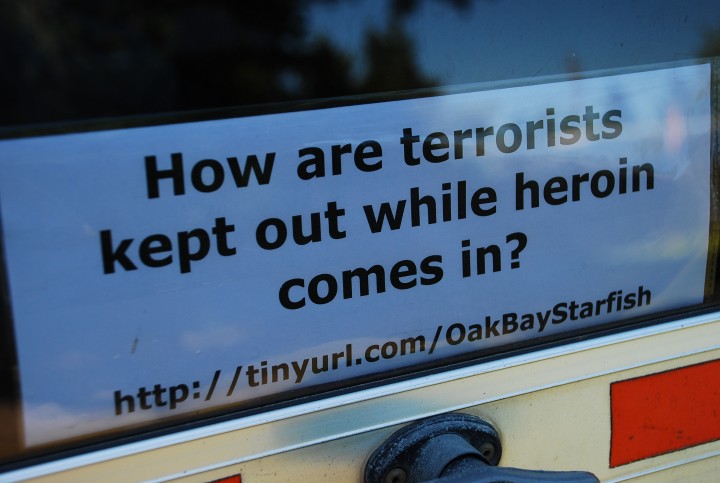Using military force requires considerable thought beforehand. Planning for afterwards doesn’t seem to be part of the USA’s war-fighting approach.
The Americans invaded Iraq with no plan for rebuilding the country, and so created what seems to be a failed state. How long after withdrawal will it take for Afghanistan to be re-taken by the Taliban – or to fail? Libya is also now officially “failed”, as most people would accept is Syria – where CIA funding created ISIS and a rebel movement that isn’t powerful enough to topple Assad but won’t go away.
Ukraine is also en route to becoming another failed state. Crimea at least will not be subject to the violence of this civil war, having been annexed by Russia.
You can only declare war on other countries. The USA’s “wars” on drugs and terror show this very clearly. Its jails are full of drug convicts, and despite massive pressure for its closure, Guantanamo Bay will remain.
Issues like drugs and terrorism require thought before action. The “war” against drugs is fought against the criminals who deal in them. They deal and make a lot of money, because drugs are illegal. You can put the criminals in jail which as we see solves nothing because people still want to buy drugs. So winning the “war” against drugs requires people to stop wanting them – which in a democracy is not something a government can enforce.
Terrorism has causes. In Northern Ireland its basis was discrimination between Republicans and Unionists, fuelled by economic factors like poor housing. Terrorists use dissatisfaction to create platforms from which to pursue their own much more specific and violent aims. The need and desire for a Palestinian state has been hijacked by a progression of terrorists; as has Syrian resistance to the Assad regime (by ISIS).
As with the “war” against drugs, the “war” against terror will not be won by putting all the terrorists in jail. And not by killing terrorists, as each death creates fresh young recruits.
We cannot force people to stop wanting recreational drugs. So the only solution is preventing them from buying drugs from criminals. There are also a raft of economic and social factors that contribute to people’s need to take drugs. Winning this “war”, requires addressing these causes, and at the same time shutting out the criminals. One option for shutting out the criminals, is legalising drugs.
But ideologically, many powerful lobby groups are opposed to the legalisation of drugs. Similarly, there are lobby groups opposed to talking to terrorists – which is how you begin to address the economic and social factors that underpin their activities.
So these “wars” become ideologically driven on both side. People end up in jail and get killed. The criminals and terrorists thrive, and nothing changes.
Whereas all these billions could have gone into benefitting Mankind; addressing poverty, but also forging ahead with human destiny. The Iraq and Afghan wars could have got us well on the way to Mars by now.
Which brings me back to Russia: which continues to develop its space programme. Joint USA-Russian cooperation will get Man back into space. But thanks to their petty and now futile desire to threaten Russia’s southern borders by having a Nato-oriented Ukraine, the Americans have blown that too.

One of Russian top bloggers just posted something very similar – comparing the costs of mission to Mars with NATO military expenses. Interesting article with some details about possible technologies that might be used. All in Russian so Google Translator might be required. http://fritzmorgen.livejournal.com/708868.html
This is a very interesting link, for which many thanks Rikugame. Its main point is that the money needs to allocated to space budgets now, so that as technology advances, the rockets and robotics required to build a Mars station can be developed without delay.
Some FaceBook Comments:
Paul Wordley
Hugh there was an experiment using rats and heroin addiction sevral years ago.The rats were given a terrible home, cold,wet etc.etc. and addicted to heroin which they could access by pressing a lever.They could also access food with another lever but predictably used that at a minimum, preferring more heroin.
Some of the rats were then moved to an extremely comfortable environment whilst still addicted. As you might have guessed, they weaned themselves off heroin pretty quickly. Because of the cruelty involved this experiment wasn’t repeated and the results suppressed, not because of the cruelty but the implications for humans. There isn’t necessarily a direct correlation between the actions of rats and what humans would do of course but governmental fear of there being enough of a correlation means that the results haven’t been tested in a human environment.
The majority of addicts in the 60’s , when we provided heroin rather than its more addictive substitute, methadone, were able to hold down jobs,live useful lives, etc.etc. Of course drug related crime was at a minimum and the health service wasn’t under anything like as much stress from the complications arising from drugs cut with even worse things.
A short lived experiment in Plymouth about a decade ago received much praise and endorsement from the police and the health service as well as the addicts.There is however no political will to re-introducing prescription drugs, despite the obvious advantages.
Yesterday at 10:39 · Like · 1
Hugh McManners
My personal view is by legalising drugs and addressing the social and economic factors, you greatly reduce both the police/ law enforcement bills and its associated violence and criminality; and create healthier people – even those still addicted (who are taking unadulterated legal drugs). The opposition to this is ideological and needs to be challenged.
Yesterday at 10:47 · Like · 3
Paul Wordley
absolutely Hugh, you would think that the financial gains alone would be enough for it to be implemented.